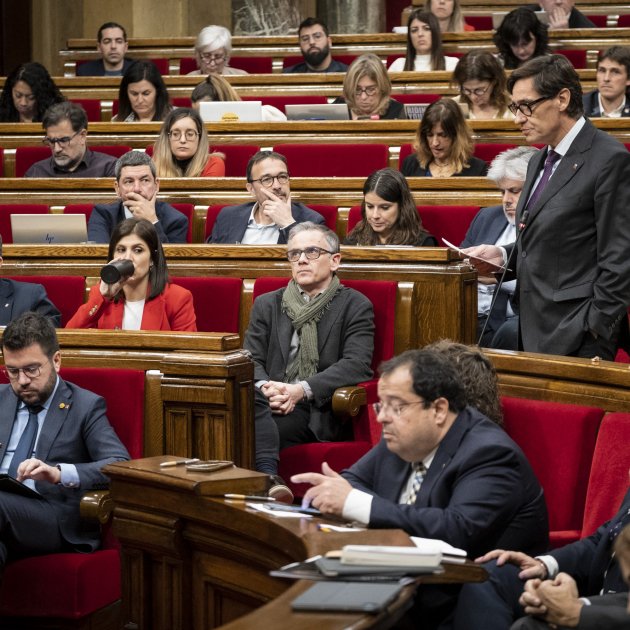The Catalan Socialist Party (PSC) would win a hypothetical Catalan parliamentary elections held this 2023, according to the first barometer by the public survey agency, the Centre for Opinion Studies. The PSC is expected to win between 34 and 40 deputies in Parliament, surpassing its current 33 seats. This would break the current tie between the Socialists and the Catalan Republican Left (ERC) at 33 seats, as ERC is projected to win between 29 and 34 seats. The best result possible that the poll gives ERC is, in fact, equal to the worst result that the PSC is predicted to achieve. In terms of the percentage of the vote, the Socialists are projected to receive between 23 and 27%, while ERC is the preferred choice of between 18 and 22%. Meanwhile, Together for Catalonia (Junts), although set to worsen its results from the last parliamentary elections held on February 14th, 2021, with the CEO forecasting a fall from 32 to between 22 and 28 seats, still maintains its position as the third strongest party, with between 14 and 17% of votes, and improves on the last CEO poll. Nevertheless, these figures could potentially undermine the current pro-independence majority in the Catalan Parliament.
PP, fourth largest party, and Ciudadanos, unsure of remaining in Parliament
Further down the rankings, the People's Party (PP) continues with its general upward trend in Catalonia, rising from being the smallest party that made it into Parliament in 2021, with only three deputies, to this 2023 poll forecast of between 8 and 12 MPs, and surpassing the other two Spanish right-wing parties, Vox and Ciudadanos (Cs). In intention to vote, this would be between 7 and 9%, practically doubling that of 2019 (3.9%). In the last survey, this rising trend for the PP was already visible, although their forecasts were even better at that point, reaching 16 deputies at the high end of the prediction range. As for far-right Vox, which broke through with 11 deputies in the last elections, the CEO gives the party between 7 and 10 deputies, while Ciudadanos, which in 2017 was the largest party in the Catalan chamber, could lose all of its 6 remaining deputies and disappear from Parliament: the poll predicts Cs to win between 0 and 5 seats.
As for the Popular Unity Candidature (CUP) and En Comú Podem (Commons), they would achieve results similar to those of the last elections: if in 2021 the far-left CUP won 6.9% of the vote and 9 deputies, now the poll gives them between 8 and 12 seats; the alternative left Commons would keep between 7 and 12 deputies, not a great change on the 8 they now have in Parliament.
Pro-independence parties could lose the majority in Parliament
In May 2021, Parliament voted to invest Pere Aragonès as president of the Generalitat with the votes of ERC, Junts and the CUP. Then, these three pro-indepe parties totalled 74 deputies. Now, according to the results of the CEO, taking into account the high-end prediction for all three parties, the total sum of MPs would be the same, 74. However, the pro-independence majority in Parliament could be at risk, since a calculation based on the lower end of the prediction would only reach a total of 59, far from an absolute majority in the chamber of 68. On the other hand, the left-wing tripartite that passed the Catalan budget - PSC, ERC anc Commons, which also totalled 74 votes - would be strengthened: taking into account the top end of the prediction, that left-tending trio would total 86 seats, and at the lowest end would reach 70, still surpassing a parliamentary majority by two seats.
CUP voters, more loyal than Junts and ERC
When it comes to those who have changed party preferences, we find both extremes. On the one hand, the PSC and Vox are tied as the parties that retain the most voters, since 83% of those who voted for them in the parliamentary elections would do so again. Of the remaining 17%, 3% of those who voted for the Socialists would switch to ERC, although the majority (9%) who walk away from the party would cast a blank or null vote, an abstention, or are still undecided. Among the far-right voters, 9% would change to the PP, which significantly improves its results compared to the last election, and none would go to Ciudadanos, with 4% opting for the PSC. At the other end of the scale are Cs: only 57% of people who voted for them in 2021 would do so again. Of the rest, 12% of those who trusted in Cs would now vote for the PSC, the same percentage as Vox, and 10% for the PP.
As for the pro-independence parties, the CUP (82%) retains most voters, with Junts (77%) and ERC (74%) following. Of the former ERC voters who opt for another option, 5% would go to the Socialists, another 5% for the CUP and 6% for Junts. On the other hand, among the former voters of Junts, the first choice is the CUP (6%), ahead of ERC (4%).
The results of the previous CEO barometer
In the previous CEO survey of Catalan political preferences, published in November 2022, the PSC already appeared as the winner of a parliamentary election in Catalonia, with results quite similar to those achieved this spring. The party led by Salvador Illa, obtained between 35 and 41 deputies, improving from between 2 and 8 on its current 33 in the house. For its part, ERC continued to be the second force, with between 30 and 36 deputies, and in the best of the scenarios it gained three more representatives, while in the worst it lost three. Meanwhile, Junts remained the third largest party, but with a clear decline in its results compared to 2021, with between 19 and 24 deputies, losing at least 8 seats.
